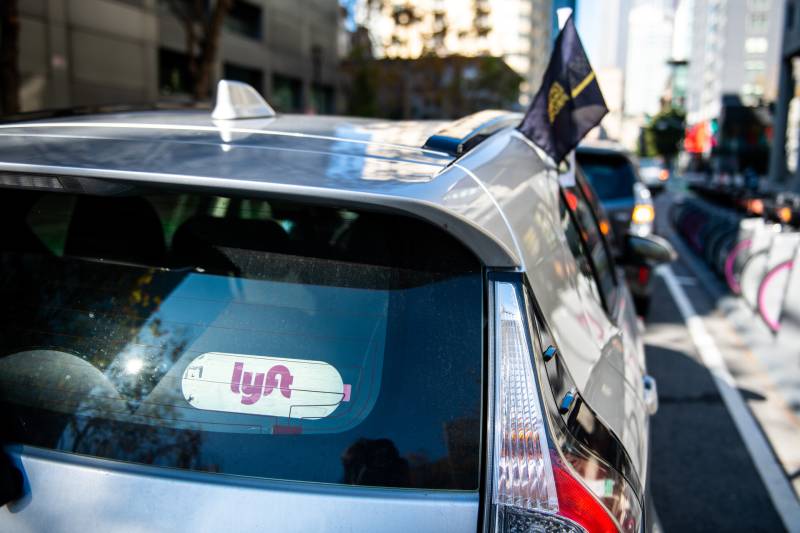Fifty-eight percent of voters passed Proposition 22 after gig companies spent more than $200 million on the campaign. After it became law, app-based platform workers became eligible for some benefits, such as guaranteed weekly earnings of 120% of minimum wage, health care stipends, and occupational accident and accidental death insurance.
Although industry-backed polls show many gig workers voted for Proposition 22 and have benefited from some of its provisions, gig workers continue to complain about their pay and working conditions.
In April, drivers protested, as they have many times, at Uber and Lyft headquarters in San Francisco. They said they were there because of low wages, safety concerns and “deactivations” — getting kicked off the apps and losing their ability to work, sometimes suddenly and without knowing why.
“It’s hard for drivers to make ends meet,” said Cesar Palancares, a field organizer for Bay Area-based worker-advocacy groups Gig Workers Rising and Working Partnerships USA, and a leader of the protests. Nowadays, he said, “Drivers often have to work 12 hours to earn what they used to earn working six or seven hours.”
Palancares said pay is still low because workers’ eligibility for the earnings guarantee is based on the time they agree to take on a gig and the time they spend on that ride or delivery, but not on the time they spend waiting for a gig.
Los Angeles-based Rideshare Drivers United is so concerned about gig-worker pay that it plans to push for pay standards, like those in New York City and Seattle, even if Proposition 22 is overturned.
“We want to build pay regulation on top of labor rights, specifically catering to how we work in this industry,” said Nicole Moore, president of Rideshare Drivers United, which plans to advocate for legislation or ordinances that would establish a rate card with a minimum rate based on miles and minutes driven.
“What we’ve learned from NYC is you can set a rate card, and you can have data from the companies that ensures that pay is high enough so your expenses are being covered,” Moore said.
The gig industry’s current estimates for average worker earnings differ widely from labor groups’ estimates: A DoorDash spokesperson said delivery workers’ average earnings were $36 an hour last year; an Uber spokesperson said its drivers’ average earnings were $33 “per utilized hour” as of the fourth quarter of last year. Industry-wide, Molly Weedn, a spokesperson for Protect App-Based Drivers + Services, said that in 2022, California drivers earned an average of $34.46 per “active hour,” including tips, an increase of 26% compared with pre-Proposition 22 times.
However, labor groups and academics have long disputed those figures, including in the legal briefs they submitted before the Supreme Court hearing because companies do not count the time gig workers wait for an actual ride or delivery. They also say the industry figures don’t factor in workers’ costs for fuel, maintaining their vehicles, health care costs — not all gig workers are eligible for the stipends — and more. A study by National Equity Atlas and others, done in 2021 after Proposition 22 took effect, found that the workers’ average earnings were as little as $6.20 an hour.
Oral arguments’ focus
The SEIU and the four gig-worker plaintiffs will argue that the state constitution grants the Legislature “unlimited power to enforce a complete workers’ compensation system.” The Legislature already spoke when it passed AB 5, they say. So they contend that “the Legislature’s exercise of that power can be withdrawn only by a constitutional amendment.”
The interveners and appellants — the gig companies and the state, which is required to defend the law — will argue that the Legislature’s “plenary,” or absolute, power over workers’ comp is not exclusive. And they will say no subject is beyond the scope of the initiative process.

